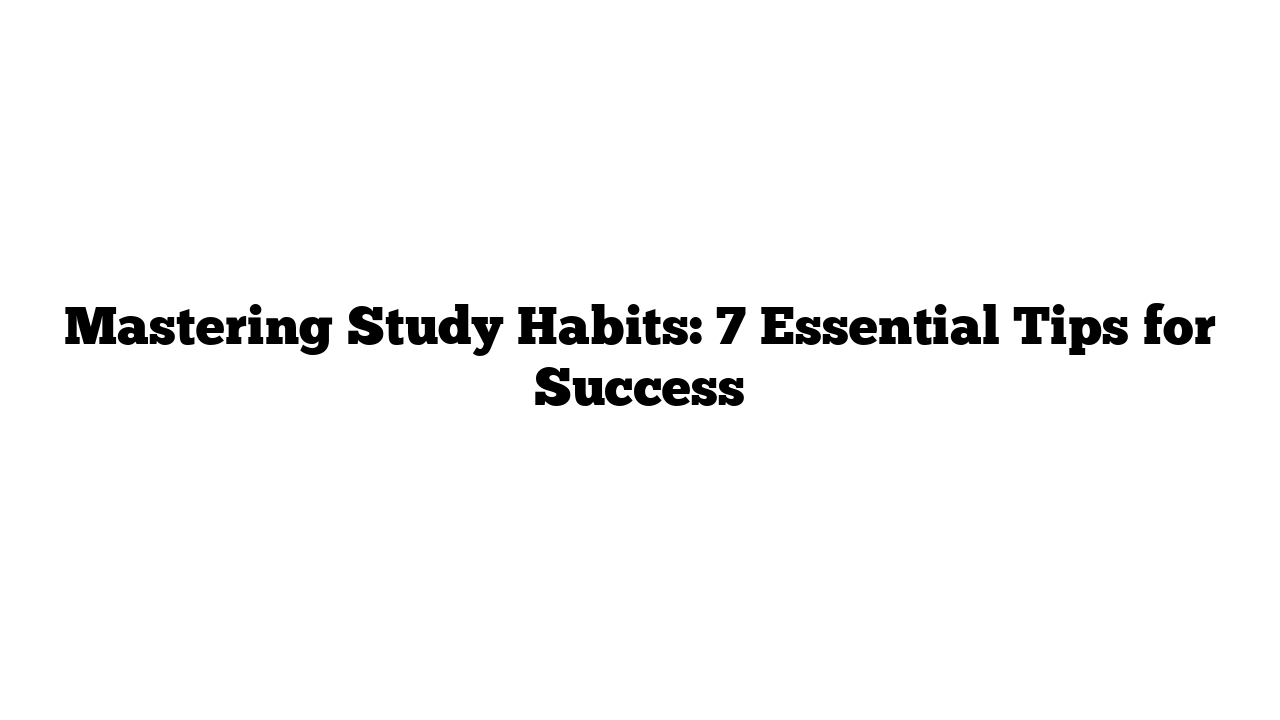Studying is more than just a task for students; it’s a vital part of lifelong learning and personal development. By mastering effective study habits, you can gain knowledge, improve your skills, and engage more meaningfully with the world around you. If you find studying boring or ineffective, you’re not alone. Many people struggle to maintain focus, leading to frustration and a sense of defeat. But don’t worry! By adopting a smarter approach to studying, you can transform this activity into an enjoyable and rewarding experience.
Here are seven practical study tips to help you master any subject and make the most of your study time.
1. Develop a Study Plan
Setting a study plan is crucial for success. Take a close look at your schedule. Determine a reasonable amount of time to study each week without overwhelming yourself. It’s essential to avoid long study sessions that can lead to fatigue.
Tips for a Study Plan:
- Create a schedule: Write down exactly when you will study and for how long.
- Break it up: Instead of cramming all the material at once, divide your study content into manageable chunks.
- Set goals: Create specific goals to measure your progress. This way, you can track your achievements, even without an upcoming test.
According to the California State Polytechnic Institute, students should aim for two to three hours of study for every hour spent in class. If you’re struggling to focus, consider techniques like the Pomodoro Technique, which involves 25 minutes of focused study followed by a 5-minute break.
2. Choose the Right Environment
Your study environment can significantly affect your ability to concentrate and retain information.
Tips for an Optimal Study Space:
- Organize your space: Keep your desk tidy with essential supplies like highlighters and notecards.
- Comfort matters: Use a comfortable chair to support longer study sessions.
- Background music: Some find that instrumental music helps them focus. There are many free playlists available online that can enhance your concentration.
If your home is too noisy or distracting, consider studying in libraries, parks, or coffee shops that offer a calm atmosphere.
3. Improve Your Notetaking Skills
Effective notetaking is key to successful studying. Your notes should be clear and organized.
Notetaking Strategies:
- Be concise: Write down only the essential information.
- Highlight important points: Use underlining or bullet points to emphasize key concepts.
- Visual aids: Create flowcharts or graphs to understand complex information better.
Additionally, write down any questions you have. These can be useful for later review or for seeking clarification.
4. Honestly Test Yourself
Testing is an effective way to reinforce your learning. While it can be stressful, it also ensures that you retain the information you study.
Benefits of Testing:
- Regular quizzes: A study from the University of Louisville showed that students who took regular quizzes performed significantly better than those who didn’t.
- Practice tests: Use online resources or flashcards to test yourself and prepare for upcoming exams.
Regular self-testing not only helps with retention but also calms your nerves for real exams.
5. Limit Distractions
In today’s world, distractions are everywhere. It’s vital to minimize them during study sessions.
Tips to Stay Focused:
- Put your phone away: Silence notifications and resist the urge to check your messages while studying.
- Avoid multitasking: Studying in front of the TV can split your focus. Choose one task at a time.
- Manage your breaks: Schedule regular breaks, but avoid excessive interruptions. Think of the dedicated time you put in as a way to earn your downtime.
By managing your distractions effectively, you’ll maximize your study time and ensure a more productive session.
6. Reach Out to Others
Studying doesn’t have to be a solitary activity. Engaging with others can enhance your learning experience.
Ways to Connect:
- Join study groups: Collaborating with peers can provide motivation and support.
- Seek help: Don’t hesitate to ask teachers or classmates for assistance. They can offer new perspectives or insights.
- Online forums: Use online platforms to ask questions and get answers from experts.
Connecting with others not only deepens your understanding but can also lead to lasting friendships.
7. Take Regular Breaks
Remember, studying is a marathon, not a sprint. Breaks are essential for maintaining focus and retention.
Benefits of Taking Breaks:
- Recharge your brain: Breaks allow your mind to process information and recover.
- Stay engaged: Stepping away can help you return to your studies feeling refreshed.
- Reward yourself: Use breaks as rewards. Doing something enjoyable, like a snack or a short walk, can keep your spirits high.
Research from York University highlights that taking breaks fosters long-term learning. This approach can be a game-changer for developing effective study habits.
Final Thoughts on Effective Studying
By incorporating these seven strategies into your daily routine, you can master any subject and make studying a more enjoyable experience. Remember, building effective study habits takes time and effort. Be patient with yourself as you find what works best for you.
To explore more tips and resources for enhancing your study habits, visit medicaltimes.io. Happy studying!
